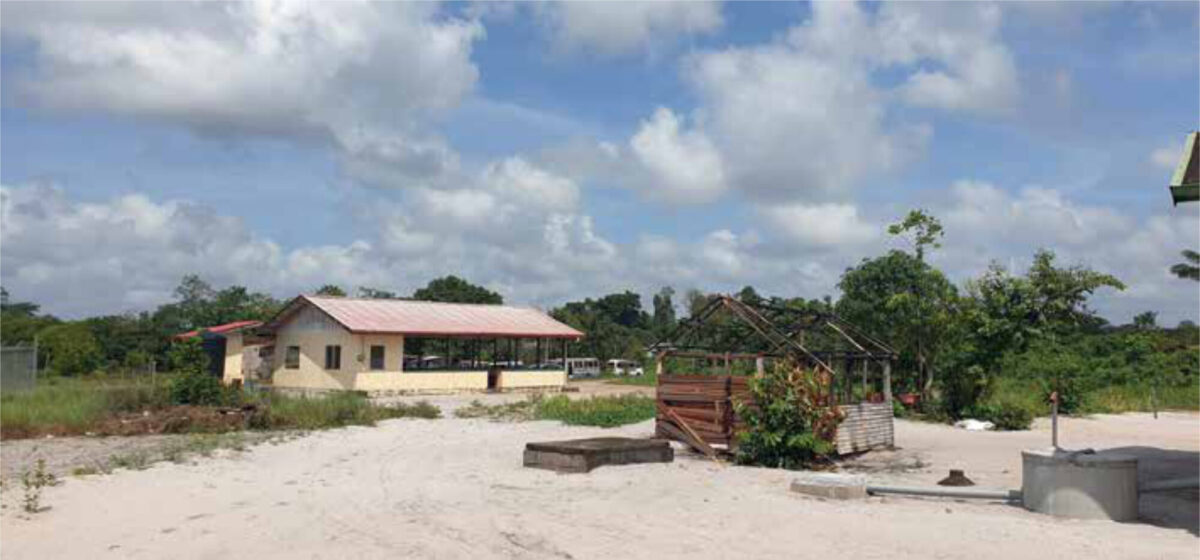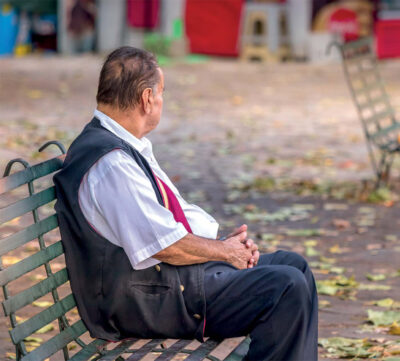Main content
Global mental health burden
Mental health and substance use disorders account for 14% of the total burden of disease [1], and about 80% of people with severe mental disorders live in low- and middle-income countries. [2] In 2019, globally an estimated 970 million people were living with a mental disorder, which is a leading cause of disabilities. 3) In many countries, mental health is not prioritised nor included in national policies and budget. In addition, there is low accessibility to prevention and care, a scarcity of resources for mental health systems, and a lack of understanding of how to best provide care for people with mental health problems. [1,4,5,6] In 2013, the World Health Organisation’s Comprehensive Mental Health Action Plan 2013-2020 was adopted in the 66th World Health Assembly, recognising the key role mental health plays in ensuring health for everyone. [6]
Treatment gap in Suriname
Recently, Suriname included mental health as a priority area in its non-communicable diseases plan. One recent large population survey investigated the prevalence of depression, general anxiety and substance use in two districts in Suriname. The rate of depression was estimated at 16% in suburban Nickerie and 18% in the capital Paramaribo, while the prevalence of general anxiety was 3% and 4% respectively [7]; alcohol abuse was 5.8% and 6.4% for men and women combined in Nickerie and Paramaribo respectively. [8]
In Suriname, less than 25% of people with mental health problems receive psychiatric treatment[7], and there are only 1.7 psychiatrists per 100,000 inhabitants to provide mental care. [9] Apart from the formal healthcare system, a traditional health care system is serving as first-line care for many patients, including those having a history of psychosis. [10] Suriname has a highly centralised mental health care system in place, with one psychiatric centre (PCS) in Paramaribo, and an outpatient unit in Nickerie.
In the rural areas, the Medical Mission Primary Health Care Suriname (MMPHCS) serves the population’s health needs by providing primary healthcare in approximately 85% of the Surinamese territory. In these hinterlands, formal mental healthcare is currently unavailable; primary healthcare workers are not well trained in dealing with mental health issues in general, and there are no psychologists or psychiatrists working in these areas. Both PCS and MMPHCS stressed the urgent need for evidence on – and better understanding of – mental health problems among indigenous people living in the hinterlands in Suriname. Indigenous people, some 3.7% of the total population, are descendants of the original inhabitants of Suriname mainly living in the interior of the country. They face a lot of social and economic adversity, and the rates and severity of mental health problems are suspected to be higher than in other population groups. As a first step, more insight into their mental health problems is needed, and therefore a qualitative study was initiated. The aim was to understand idioms of distress, local concepts and expressions of mental health problems, and risk and resilience factors, as well as to gain insight into pathways to formal and informal care.
Approach
First, free and prior informed consent was obtained from the Association of Indigenous Village Leaders in Suriname (Vereniging van Inheemse Dorpshoofden, VIDS) and local traditional authorities in Suriname. During the preparatory and the data collection phases, a participatory approach was applied to ensure engagement and ownership by stakeholders. Authorities were involved and participated in discussions on the aims of the study, and commented on the interview guide that was developed by the research team.
Second, interviews with more than seventy key stakeholders and community members were conducted between 11 and 27 March 2023. The Indigenous villages Apoera (700 inhabitants, a village in Western Suriname that can be reached by car), Kwamalasamutu (1100 inhabitants, a village in the South of interior Suriname, which can only be reached by aeroplane), and Pikin Saron (500 inhabitants, a village close to Paramaribo) were selected as study areas. Relevant stakeholders in the three villages, including the local traditional authorities (i.e., “Kapiteins” and “Basha’s”), Shamans, Church leaders, primary healthcare workers, members of women’s organisations and community members were interviewed, by the research team, either with personal interviews or in focus group discussions. The Sondeo method was adopted to reach a high level of community appraisal in a short period of time, and to stimulate reflection throughout the data collection process. [11]
Preliminary findings
Thematic analysis of the data is still ongoing, but the preliminary results of this study showed that stress, emotional problems, and suicide were common in the local communities, according to the participants. These problems were attributed to poverty, entrapment, domestic violence, alcohol and drug abuse, and supernatural causes. The threshold for talking about problems was considerable because of mistrust and shame in the local communities according to the participants. If there was any support, it was mainly provided by social organisations, such as traditional leaders, churches, women groups, or soccer clubs. In addition, participants mentioned that traditional healers are visited for mental health problems and people did not seek help at the primary healthcare centres in the communities. Community health workers were not trained to deliver any form of treatment and there was no collaboration with psychiatric specialists. The study participants expressed an urgent need for ways to address their social and social economic circumstances that seemed to be related to their mental health conditions. Key stakeholders and community members are being informed and consulted on the preliminary findings.

The way forward
These results demonstrate that there is work needed at different levels to improve mental health among Indigenous communities. Solutions would need to address social, cultural, and spiritual determinants of mental health problems, and would need to consider the limited available financial and human resources. The Lancet Commission on Global Mental Health and Sustainable Development has proposed that the involvement of non-specialists in delivering mental health interventions offers an opportunity to address global mental health challenges in a context of remaining treatment gaps. [12] We propose a stepped care approach, which is an evidence-based, staged approach whereby mental healthcare is tailored to population needs and health system abilities, offering the possibility to step down or up to a different care level. Building upon the qualitative needs assessment, the next steps we see as necessary include building community-based support systems, as well as strengthening the primary healthcare system and integrating structural consultation services with specialist psychiatric care providers.
References
- Whiteford HA, Degenhardt L, Rehm J,et al. Global burden of disease attributable to mental and substance use disorders: findings from the Global Burden of Disease Study 2010. Lancet. 2013 Nov 9;382(9904):1575-86. doi: 10.1016/S0140-6736(13)61611-6.
- Bhugra, Dinesh, and others, ‘Mental health in low- and middle-income countries’, in Dinesh Bhugra, Driss Moussaoui, and Tom J Craig (eds), Oxford Textbook of Social Psychiatry, Oxford Textbooks in Psychiatry (Oxford, 2022; online edn, Oxford Academic, 1 Aug. 2022), https://doi.org/10.1093/med/9780198861478.003.0072
- World Health Organization. World mental health report: transforming mental health for all. Geneva, 2022. Available from: https://iris.who.int/bitstream/handle/10665/356119/9789240049338-eng.pdf?sequence=1.
- Charlson FJ, Ferrari AJ, Santomauro DF, et al. Global Epidemiology and Burden of Schizophrenia: Findings From the Global Burden of Disease Study 2016. Schizophr Bull. 2018 Oct 17;44(6):1195-1203. doi: 10.1093/schbul/sby058.
- Morgan C, John S, Esan O, et al. The incidence of psychoses in diverse settings, INTREPID (2): a feasibility study in India, Nigeria, and Trinidad. Psychol Med. 2016 Jul;46(9):1923-33. doi: 10.1017/S0033291716000441.
- World Health Organization. Mental health action plan 2013–2020. Geneva, 2013. Available from: https://www.who.int/publications/i/item/9789241506021
- Jadnanansing R, de Beurs E, Etwaroo K, et al. A survey of depression and anxiety disorders in urban and rural Suriname. BMC Public Health. 2022 Jan 8;22(1):51. doi: 10.1186/s12889-021-12454-5.
- Jadnanansing R, Blankers M, Dwarkasing R, et al. Prevalence of substance use disorders in an urban and a rural area in Suriname. Trop Med Health. 2021 Feb 2;49(1):12. doi: 10.1186/s41182-021-00301-7.
- Mental health atlas 2020. Available from: https://cdn.who.int/media/docs/default-source/mental-health/mental-health-atlas-2020-country-profiles/sur.pdf?sfvrsn=543e312f_6&download=true
- van Beek A, de Zeeuw J, de Leeuw M, et al. Duration of untreated psychosis and pathways to care in Suriname: a qualitative study among patients, relatives and general practitioners. BMJ Open. 2022 Feb 2;12(2):e050731. doi: 10.1136/bmjopen-2021-050731.
- Butler LM. The “Sondeo” A rapid reconnaissance approach for situational assessment. (1995). Available from: : https://fyi.extension.wisc.edu/wateroutreach/files/2016/01/Butler_SONDEO_pub__17586471.pdf.
- Patel V, Saxena S, Lund C, et al. The Lancet Commission on global mental health and sustainable development. Lancet. 2018 Oct 27;392(10157):1553-1598. doi: 10.1016/S0140-6736(18)31612-X.



















































